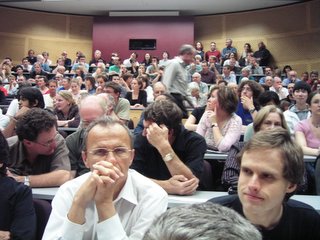"An answer is always the part of the road that is behind you.
Only questions point to the future."
- Jostein Gaarder
- Jostein Gaarder
How we love to have someone tell us how the future is going to unfold, and Lord Oxburgh's lecture at the University last night was no different. The advertised subject matter - climate change - filled the house, and people sat in the aisles and on any spare piece of floor near the podium.

But what a burden it must be to be a scientist in today's society - to be expected to know the answers to the hard questions.
His presentation started off on a note I could relate to. The fact that we have been born into a world of cheap fuel has led us down a dead end road. Having created an infrastructure which depends on oil at every turn, we are moving at a dangerously slow pace to embrace the necessary changes from an oil economy to . . . well this was the sticky point.
There was lots of talk of bio fuels and how (apart from a small experimental plant in Canada producing a new form of ethanol) most of the bio fuel potential is abysmally un-hopeful, since after you take away the fuel used to grow and process the stuff, there's bugger-all left over.
There was talk of changing the infrastructure - cars, planes, power plants, and so on to make them more efficient, and cleaner running. He even suggested how many decades it would take for each of these, but the fact is that there is little happening in this area so far, and he was very clear on this much - that time is running out.
Then the statistics came thick and fast. A particularly shocking one referred to coal reserves and who has them, and who is likely to use them. And what will be the impact on the CO2 levels when countries like China start to burn the stuff willy nilly (without developing the - still theoretical - carbon trap systems in the power plants). Yikes!
Seriously, the man knows a lot and good on him for standing up and saying what he does, but it was all a bit too polite for my taste. No, this was not someone willing to take society's denial-bull by the horn, and say it like it is. Don't panic the people, whatever you do. And keep them thinking that the corporations and the politicians are going to fix it for us if we just write them a letter every month asking them to tweak the system a little bit, by making nice labelling systems to tell us which washing machine is most energy efficient.
I think Mr Oxburgh is probably still on the Shell Corporation's payroll, and certainly his past involvement allowed him to reveal various technological inventions that they (we?) hope will be fixes for our problems. As for asking or demanding the politicians fix things, who do you imagine decides which politicians are going to be in power, but the corporations who fund the parties that will bring forth the legislation to benefit them. And the very fact of asking/demanding gives our power away and reinforces the assumption that we are weak and they are strong. This is not the society I want to live in.
Sorry but it wasn't what I was looking for. My only regret is that I didn't get up at the end and take the microphone and tell everyone what they probably quietly suspect, but are hoping is not true - that it is going to require each and every one of us to make a change of lifestyle that will involve reducing our consumption dramatically and our CO2 footprint with it. And that is a big conversation because it penetrates the very core of who we think we are.
I believe there is a place of deep stillness where we sense our life is a passing play, full of mystery and magic, and where we came from and where we go will only be known when we get there. For now we are here and we need not fear for our survival, our continuance, or our end. All is well. Only from this place can we release our obsessive compulsive consumption.

Here's the CO2 graph that shows us going off the chart a few short years ago. We were told that the critical CO2 PPM (Parts per million) is 550.
** For a lengthy, and very readable and worthwhile article on denial - Gaia and Psychology click here...

1 comment:
This letter came through from one of Auckland University's Environmental lawyers:
Hi James,
I fully agree with your essay. The Lord was very English: polite, witty and understating, thus trivializing what really is at stake. The publicity on the cc conference in Wellington was helpful though.
One good thing is Jeannette’s private members bill to get the RMA and local government enforcing emission standards and passed in the first reading. Exactly what I had advocated in: Bosselmann/Salinger/Fuller, Climate Change in New Zealand: Scientific and Legal Perspectives, 2002. Sometimes, just sometimes the Government appears to be listening.
Klaus Bosselmann
Post a Comment